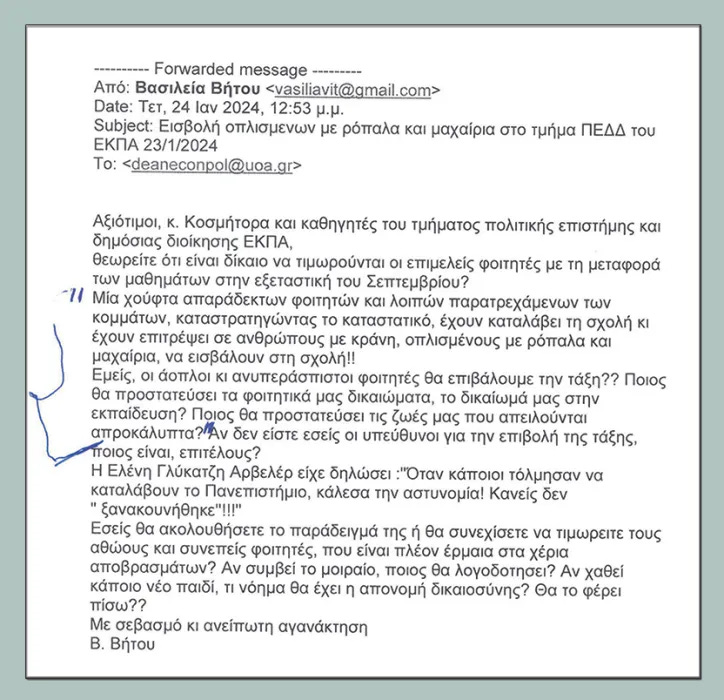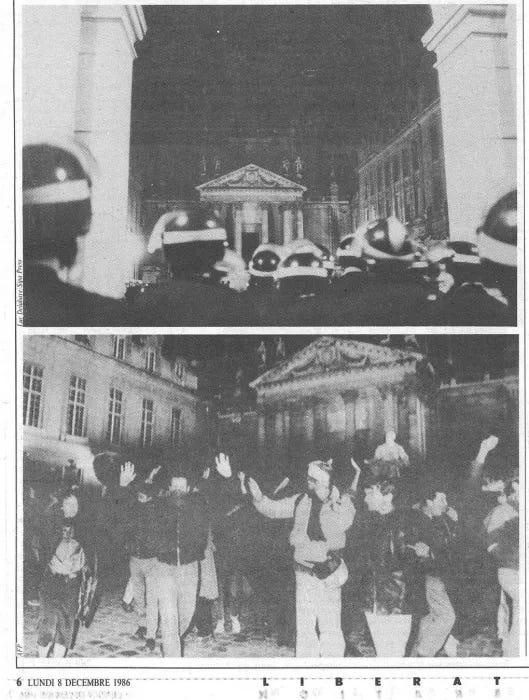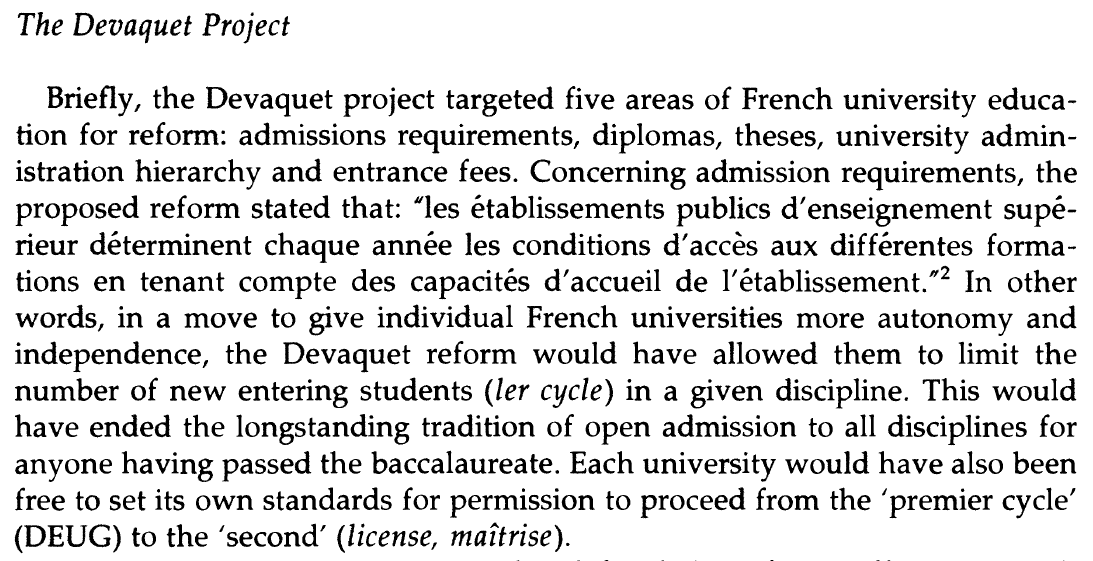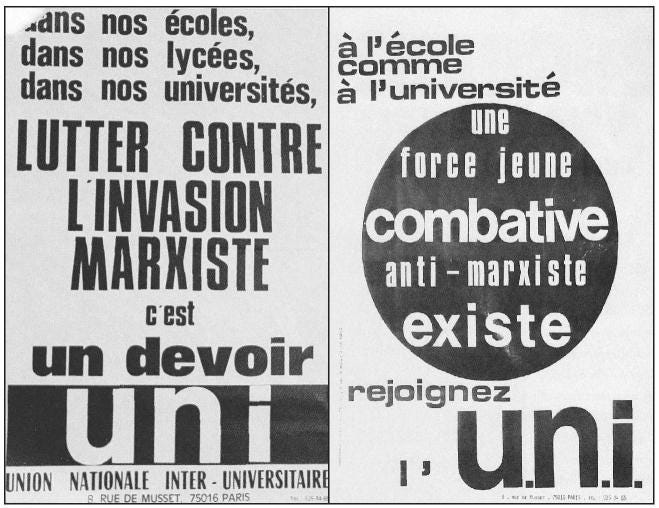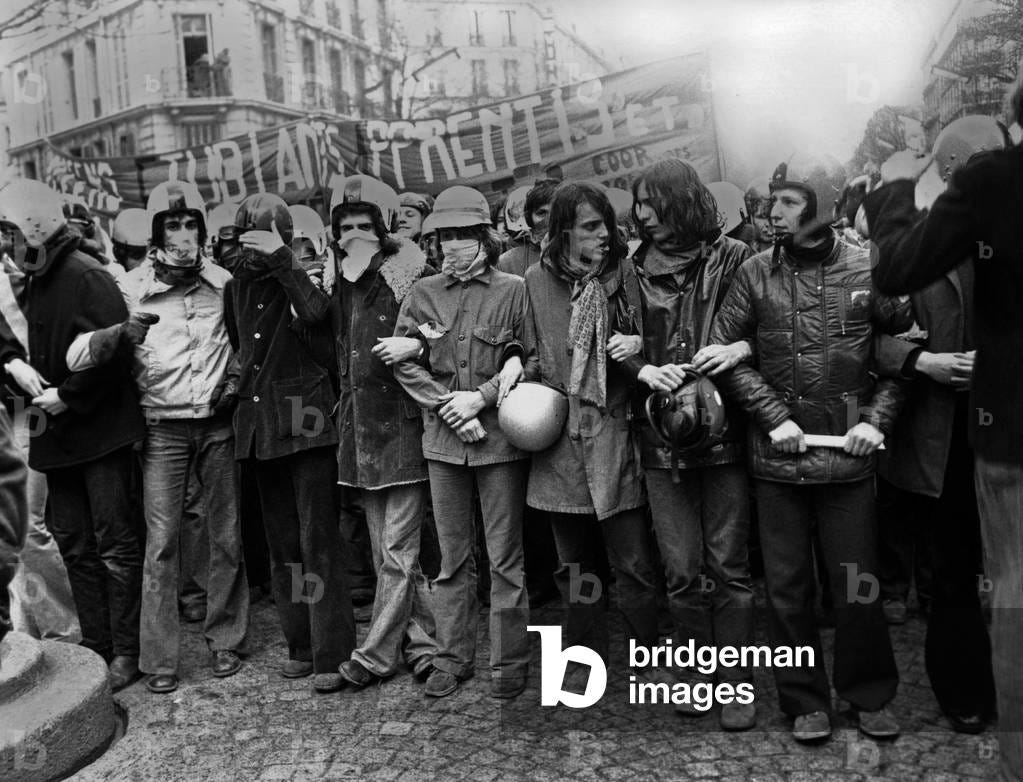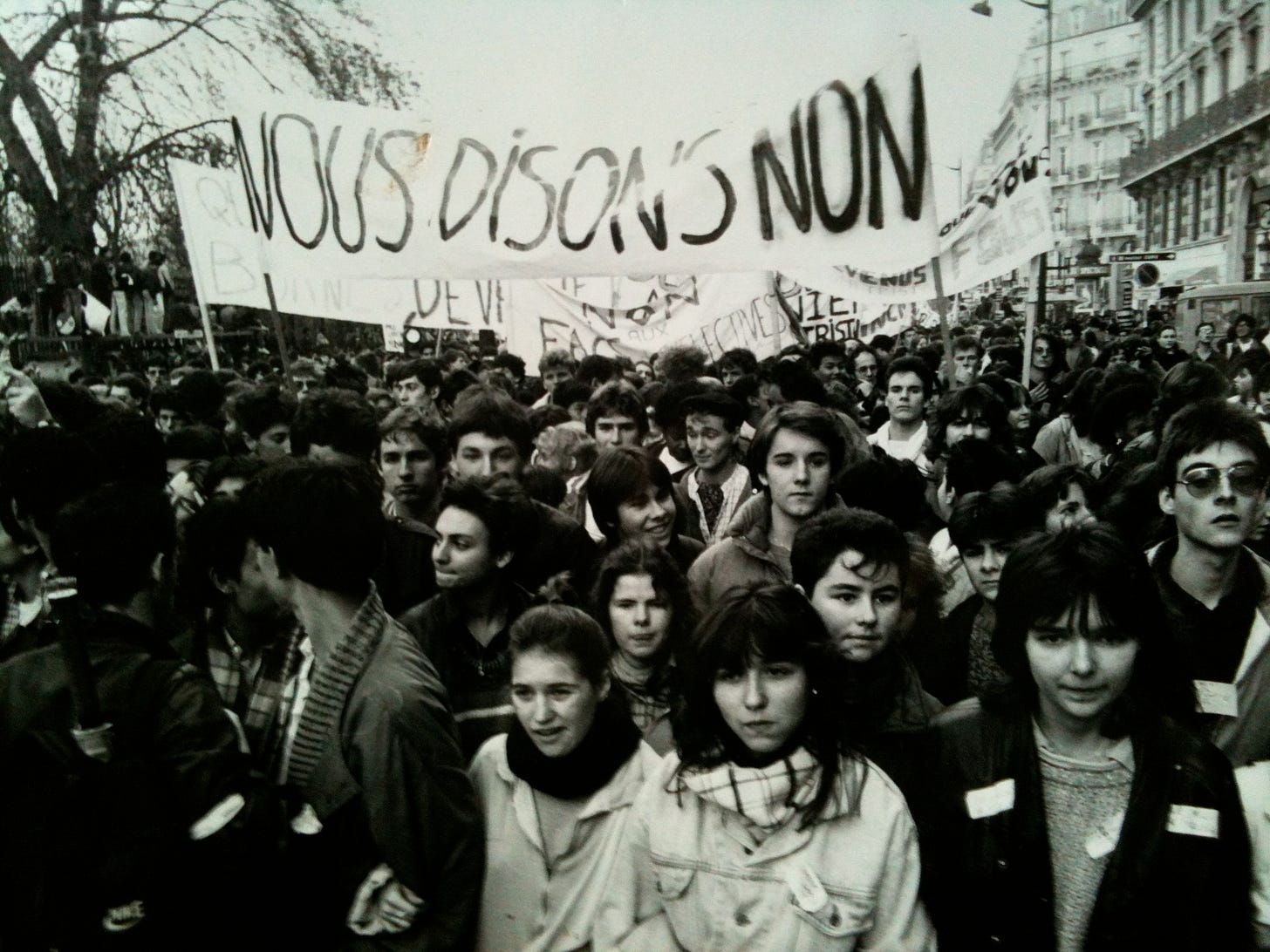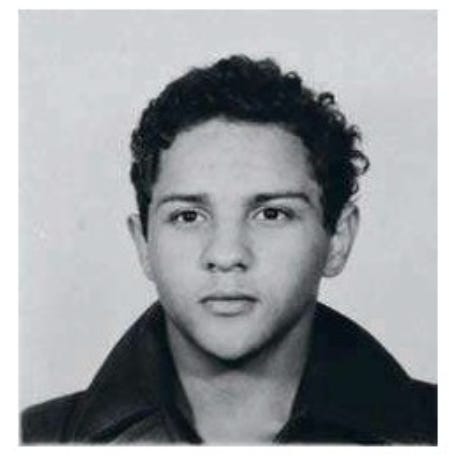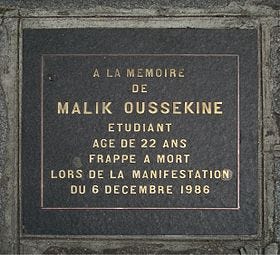Absurd tales of social decadence
There is an emerging social movement in Greece, mobilising in opposition to an education reform that aims, among other things, to introduce private Universities. While part of this opposition is expressed in pointing out the unconstitutional nature of the education reform (1), the main form of opposition is expressed through widespread University occupations, demonstrations and other forms of action. As usual, these mobilisations are met with a combination of state repression (violent evictions of occupations, police attacks on demonstrations) and propaganda.
The main gist of the propaganda is the consistent presentation of Universities as “asylums of anomie”. This was, after all, the predominant portrayal of public Universities weaponised by New Democracy in 2019 when it abolished the post-dictatorship legislation that forbid police presence on University campuses and attempted (unsuccessfully) to introduce a special University police unit (For a good account of this, read this nice piece by Eirini Fasia for the Verfassungsblog).
The image of Universities as “asylums of anomie” represents, in reality, a deliberate exaggeration and is part of a consistent attempt to criminalise both the politicisation of University campuses (led by students) and their persistence as public spaces of resistance to governmental legislation and authoritarianism (this includes their use by non-students).
The persistent myth of Universities as “asylums of anomie” has been revived in public discourse due to the current mobilisations. In this conjuncture, it takes the form of the repeated ad nauseam narrative that University occupations are organised and imposed by non-students who are, if we are to take mainstream news seriously, extremely violent ones. Needless to say that government-friendly media outlets play a central role in repeating, spreading and embedding this narrative.
It was in this context that the following bizarre story took place. If it somehow stood out (urging me to write this piece) it was not merely because of the hilarious idiocy of the people involved in fabricating the story you are about to read. Idiocy is, for all purposes, often indistinguishable from sheer arrogance, especially at times when those in power feel that they face no substantial opposition. What made this story even more interesting relates to another aspect of the contemporary rise of the far-right/authoritarian liberalism framework: the systematic rewriting/weaponisation of historical events in a way that serves as a reinforcement of these actors’ contemporary narratives and visions. If Italy’s Meloni proceeds by “Relitigating World War II” in order to present Italian fascists as victims, as David Broder recently wrote, her admirers in Greece are not yet that competent. That does not, however, make them less dangerous.
1.
On the 25 of January 2024, a conservative daily in Greece, Καθημερινή, published a letter sent by a female Law student in her 4th year. While her name was withheld from publication (already hinting at the potential backlash that she might face), her words struck a familiar chord for those used to reading this specific newspaper. In a few short paragraphs, she described her “shock” about the situation inside Universities.
Only a few days before, she recounted, an open assembly called to discuss the potential of occupying the University campus in opposition to the new education reform was essentially taken over by “non-students”. For an audience that relishes right-wing frameworks and narratives, her account was harrowing: not only did the assembly discuss, for 5 hours (!), a whole range of “irrelevant topics” (such as the war in Palestine) but when the moment came to vote on the proposed occupation, all doors was suddenly locked and non-students wearing masks started intimidating and threatening any student who wanted to vote against the occupation. A few brave enough to protest, she continued, were shouted down, chased, even beaten up. Someone fainted. Quelle horreur!
Her conclusion was as powerful as her story: this was nothing but “fascist terrorism”, imposed by “lazy outsiders” on hard-working students deeply concerned about their upcoming exams and their future. The title chosen for her letter summed up the outrage: “It should not be possible that 10 people decide about the lives of 2.000”.
2.
The day after, another article was published by Καθημερινή on the topic. Written by one of her staff journalists, it took another shot at the “escalating anomy” inside Universities, illustrated with a menacing photo of some burning dumpsters. While forced to admit that the overwhelming majority of Universities across Greece were under occupation, the journalist was clearly concerned about clarifying that this should not and could not be seen as the result of a democratic, majority decision. Instead, the amount of occupations only testified to the increase of “terrorism inside the assemblies”. Citing indignation on the part of professors and students who saw a visible risk that the semester will be lost, the article strengthened the narrative of full anomie by claiming that the notion of a police intervention to stop the occupations was maturing. Why? Because “students’ very lives are threatened by unknown masked men”. Double horreur!
To bring this unspeakable horror home, the concerned journalist provided a direct quote from a letter written by a desperate, male [it matters] student:
“A bunch of unacceptable students and other lackeys of various political parties have undermined all protocols, have occupied the University and have allowed people with helmets, armed with baseball bats and knives, to invade the University. Who will restore order? We, unarmed and defenceless students? Who will protect our student rights, our right to education? Who will protect our lives now that they are openly threatened?”
Μια χούφτα απαράδεκτων φοιτητών και λοιπών παρατρεχάμενων των κομμάτων, καταστρατηγώντας το καταστατικό, έχουν καταλάβει τη σχολή κι έχουν επιτρέψει σε ανθρώπους με κράνη, οπλισμένους με ρόπαλα και μαχαίρια, να εισβάλουν στη σχολή. Εμείς, οι άοπλοι κι ανυπεράσπιστοι φοιτητές θα επιβάλλουμε την τάξη; Ποιος θα προστατεύσει τα φοιτητικά μας δικαιώματα, το δικαίωμά μας στην εκπαίδευση; Ποιος θα προστατεύσει τις ζωές μας που απειλούνται απροκάλυπτα
To attest to the validity of the letter, the journalist provided a link, since the letter had been published the previous day by his newspaper. Curiously, however, clicking on the link brought one to the very letter that I mentioned in the above section. Not only was that letter written by a female student in her 4th year of Law School, instead of a male student of Political Sciences and Public Administration to whom the journalist attributed it in his article (innocent mistake, one might say), but the actual quote appears nowhere. Let me repeat: the quote that appears on the article does not exist in the letter to which he linked.
Another innocent mistake. It happens to all.
3.
On January 29th, the same journalist publishes yet another article that brings to life the indescribable horror experienced by hard-working students and professors inside those ransacked temples of knowledge. A student is quoted claiming that “the whole anarchist scene of Thessaloniki comes to the student assemblies” (the implication, for those who did not get it, is that clearly one cannot be an anarchist and a student). Another one swears that she saw “hatred in their eyes”. A frightened mother does not hesitate to describe the situation as a “dictatorship of the left”. And, of course, the notorious letter of the (male) student with the masked men armed with knives is quoted again. (No link is provided this time). University authorities are also scorned for their lack of willingness to call the police on the squatters, while “political parties” (presumably of the left, though that is not clarified) are derided as responsible for “providing justification for the occupations and the attacks against students (sic)”. L'horreur n'a pas de fin.
4.
As this infamous letter was getting so widely circulated and quoted, however, other journalists contacted Καθημερινή to inquire more information about its author. Whether it was the newspaper, bound by a journalistic code of conduct, that eventually provided the original letter to the inquiring journalists or not remains unclear. But what became entirely clear, after the original letter was published by the leftist daily ΕφΣυν, was that second letter, with the bats and the knives, was signed by someone called “Βασιλεία Βήτου”, a woman claiming to be a student of the Political Science and Public Administration department.
The only problem was: there is no student registered under that name in this University. In fact, there is no person registered under this name in the whole of Greece.
5.
The irony of inventing a non-existent student in order to rave against the unacceptable influence of non-students in University assemblies is such a chef’s kiss that only a dim-witted right-wing fanatic could have come up with it.
6.
But the story does not really end here. In fact, this is perhaps the least interesting aspect of it. Once the whole narrative of Universities as battle grounds between innocent students and hardcore anarchists wielding knives has been established, the notion that the student was afraid to give her actual name in fear of repercussions is easy to swallow. More importantly, journalistic credibility in terms of verified and verifiable sources is not really a major concern in the Greek media landscape (being 107th in the world and last in Europe in terms of press freedom is not won without effort).
What makes the letter fascinating is the way it ends.
After the already-mentioned parts about thugs with helmets, baseball bats and knives and the cries of desperation about student lives in direct danger, the author of the letter closes by writing:
Helene Glykatzi-Ahrweiler had said: “When some dared occupy the University, I called the police. None of them dared ever again.” Will you follow her example or will you continue to punish the innocent and industrious students who are now prey in the hands of scumbags? If the worst happens, who will be held responsible? If a young person dies, what meaning does justice have? Would it bring them back?
This is a truly amazing paragraph. Because it reveals so much about the ideological orientation of the non-student who wrote it (possibly even their age), as well as a rather bizarre approach to historical events.
Bare with me as this takes us back in time. (I owe a lot of what follows and some of the pictures to this brilliant expose by Tasos Kostopoulos)
7.
Helene Glykatzi-Ahrweiler is a famous French-Greek Byzantinologist. Between 1981 and 1989 she held the position of chancellor at the University of Paris.
Her quote about inviting the police to evict a University occupation refers to her 1986 decision to call the French riot police (CRS) to evict the occupied Sorbonne in Paris.
8.
Why was the Sorbonne occupied? Because French PM Jacques Chirac and his Minister of Education Alain Devaquet were trying to pass an education reform that would open the way for the privatisation of higher education.
Known as the Loi Devaquet, the reform aimed at bringing French universities closer the US model under the well-known euphemism of “liberalising the education system”. “Liberalisation”, as always, meant making University funding dependent on the private sector and introducing tuition fees. The reform was also meant to provide Universities with another buzzword, “autonomy”, this time in deciding the selection criteria for students.
As students, pupils and trade unions interpreted it at the time, this was nothing but a class restructuring of the education system that would render higher education a privilege only of those who could afford it, following the neoliberal model of privatisation.
9.
The right-wing had its own view. As the right-wing Union Nationale Inter-Universitaire (UNI) put it at the time, “the French University […] is essentially a healthy body underneath, and it would be enough to strengthen specific parts for it to regain its dynamism […] Some parts are so weak or even dead that cannot be saved by any means.”
In typical Thatcherite rhetoric, they continued by adding that “We must finally denounce the myth of free higher education: everything is paid for, and what is supposed to be free has been paid for by others.”
10.
Not convinced about how defunding public education and increasing the profitability of the private sector was beneficial to them, a massive social movement emerged in opposition to the law which many have described as larger, if not of May 1968 than at least the 1973 movement against the Debré reforms - whose main goal was to force students to undergo military service before entering University.
[Demonstration against the Loi Debré, 1973]
[Mobilisation against Loi Devaquet, 1986]
11.
In November 1986, massive demonstrations took place all over France. In Paris, the protestors were violently attacked by the fascist group GUD.
According to reports at the time, the nazi thugs of the GUD who had attacked the occupied Jussieu University the previous day had emerged out of a yellow van that was used by the UNI to put up posters around Paris later that day.
[Side note: The GUD was disbanded but recently revitalised. It is the same fascist group that organised this demonstration in Paris last May.]
12.
In December 1987, a demonstration of more than 150.000 protestors was violently attacked by the CRS, resulting in massive riots. Two students were seriously injured. The day after, a mass demonstration against police violence met the same fate with attacks from both CRS and PVM (motorised police units). Many protestors find refuge in the occupied Sorbonne.
On the night between the 5th and 6th of December, Chancellor Ahrweiler invites the CRS to evict those occupying the Sorbonne. After the successful eviction, units of the PVM roam the streets looking for “rioters”.
Malik Oussekine, a student returning from a jazz club, was spotted by the PVM while trying to enter his house. As far as I could research, he had not taken part in the demonstration or the occupation of the Sorbonne.
He was beaten to death at his entrance hall, in front of an employee of the Ministry of Finance who tried, in vain, to help him.
Two days later, on December 8, 1987, Jacques Chirac accepted the resignation of Devaquet and announced the withdrawal of the proposed education reform.
13.
It remains unclear to me whether the real author of the fake letter is fully aware of the story behind Arhweiler’s decision to invite the CRS to evict the occupation and its deadly consequences. It might well be the case that they found the quote somewhere, thought it perfectly expressed their authoritarian impulses and, borrowing the fame of the renowned Byzantinologist, tried to present violent police evictions as highly normalised and acceptable conduct. Especially when “student lives are in immediate danger”.
But there is also another, more sinister potential. That the author knows full well the real story, knows well that Arhweiler’s decision to invite the CRS led to the brutal death of Malik Oussekine and it is precisely this murderous fantasy that is in full display. The rhetorical questions posed at the end of the letter about the potential of a “young person losing their lives” are, in the context of Arhweiler’s praised decision, too specific to be coincidental. If anything else, in the real world of today’s University occupations, assemblies and demonstrations, no student life is in danger. Until the police gets there.
Notes
(1) Art. 16 of the Greek Constitution forbids the creation of private Universities. §1 states that “Art, science, research and education” should not only be free but their free provision an obligation of the state. §4 says that all Greek citizens have a right to free education at all levels. §5 states that “higher education should be exclusively provided by institutions that are legal bodies governed by public law that enjoy full self-governance”. Finally, §8 unequivocally states that “the foundation of higher education institutions by private persons is forbidden”.







